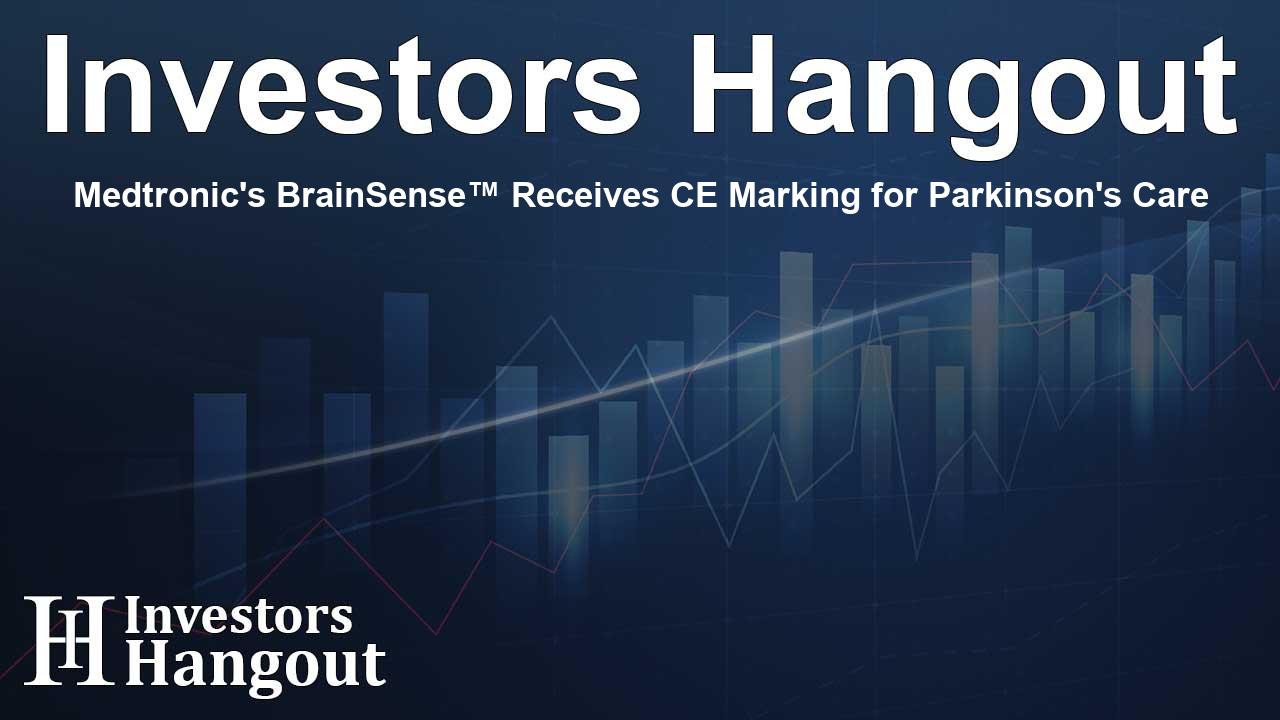Medtronic's BrainSense™ Receives CE Marking for Parkinson's Care

Medtronic’s Innovative Approval for Parkinson's Treatment
Medtronic plc (NYSE: MDT), a global leader in healthcare technologies, has achieved a significant milestone by receiving CE Mark approval for its BrainSense™ Adaptive deep brain stimulation (aDBS) system and the BrainSense™ Electrode Identifier (EI). This remarkable advancement introduces the world's first closed-loop DBS system that adjusts stimulation in real-time based on the patient's individual brain activity, transforming care for individuals managing Parkinson's disease.
Redefining Deep Brain Stimulation
For three decades, deep brain stimulation has helped those suffering from Parkinson’s disease manage their symptoms by sending electrical signals to the brain to regulate involuntary movements. The introduction of BrainSense™ aDBS represents a leap forward, allowing for dynamic adjustments of stimulation tailored to each patient’s unique neurological patterns. By actively engaging with each patient’s brain activity, this system enhances the effectiveness of therapy in both clinical environments and daily settings.
The Impact of Parkinson’s Disease
Parkinson's disease affects millions worldwide, causing significant distress in mobility, speech, and daily activities. Over 1.2 million individuals in Europe alone face the challenges of this condition, which can profoundly impact their ability to enjoy life fully. The struggles range from simple tasks, like enjoying coffee, to essential social interactions, affecting both patients and their caregivers.
Pioneering BrainSense™ Technology
Paolo Di Vincenzo, president of Medtronic’s Neuromodulation business, emphasizes that BrainSense™ technology is central to personalizing DBS therapy. The recent advancements in this technology, from refined contact selection to the ability to automatically adjust treatment based on real-time data, signify a transformative change in patient care. These innovations not only aim to enhance the precision of interventions but also embody Medtronic’s mission to improve the quality of life for those living with Parkinson’s.
Clinical Significance of the New Approval
The approval of the Medtronic Percept™ DBS system with BrainSense™ sets a new standard in the neurostimulation landscape. By recording and analyzing brain signals, it aims to create therapies that resonate with each patient's individuality. This pioneering effort aligns with the growing trend in the medical field toward using advanced technologies for better patient outcomes and disease management.
Comments from Medical Experts
Dr. Martijn Beudel, a neurologist from Amsterdam University Medical Center, underscores the significance of adaptive deep brain stimulation, stating that this technology can tailor treatment to meet the changing needs of Parkinson’s patients. The integration of real-time activity adjustments demonstrates a clear commitment to enhancing patient-specific care and outcomes.
History of Medtronic's DBS Technology
Medtronic is not new to the deep brain stimulation realm, having been a pioneer of continuous DBS therapies for managing Parkinson's symptoms. The launch of BrainSense™ aDBS enhances this legacy by facilitating dynamic stimulation calibrated to the patient’s own neural signals, reflecting a deep understanding of the technological possibilities in healthcare.
Enhancements in Programming Efficiency
BrainSense™ Electrode Identifier adds another layer of precision. This remarkable tool provides clinicians with real-time insights into patient-specific brain signals, allowing them to quickly identify optimal stimulation sites. This advancement promises to streamline programming and make the initial programming phase more efficient, paving the way for more successful treatments.
The Road Ahead for Medtronic
Medtronic is committed to expanding the reach of its technology. The BrainSense™ aDBS and EI will be available in Europe in early 2025. Furthermore, Medtronic has also sought U.S. FDA approval, aiming to bring this innovative treatment to patients who can benefit from it.
Frequently Asked Questions
What is BrainSense™ Adaptive deep brain stimulation?
BrainSense™ aDBS is a cutting-edge deep brain stimulation technology that adjusts therapy in real-time based on individual brain activity, enhancing patient-specific treatments for Parkinson's disease.
How does Medtronic contribute to Parkinson's care?
Medtronic provides advanced therapies, including the latest aDBS systems and tools that personalize DBS for patients, improving their quality of care and daily living.
What technology does BrainSense™ use?
BrainSense™ utilizes real-time brain signal analysis to dynamically adjust stimulation, improving the personalization and effectiveness of treatments for patients with Parkinson's.
When will BrainSense™ technology be available for patients?
The BrainSense™ aDBS and Electrode Identifier are set to be available in Europe in early 2025, with further expansions targeting the U.S. market.
What challenges does Parkinson's disease present for patients?
Patients face debilitating effects including mobility challenges, speech impairments, and social interaction difficulties, significantly impacting their quality of life and daily activities.
About The Author
Contact Logan Wright privately here. Or send an email with ATTN: Logan Wright as the subject to contact@investorshangout.com.
About Investors Hangout
Investors Hangout is a leading online stock forum for financial discussion and learning, offering a wide range of free tools and resources. It draws in traders of all levels, who exchange market knowledge, investigate trading tactics, and keep an eye on industry developments in real time. Featuring financial articles, stock message boards, quotes, charts, company profiles, and live news updates. Through cooperative learning and a wealth of informational resources, it helps users from novices creating their first portfolios to experts honing their techniques. Join Investors Hangout today: https://investorshangout.com/
The content of this article is based on factual, publicly available information and does not represent legal, financial, or investment advice. Investors Hangout does not offer financial advice, and the author is not a licensed financial advisor. Consult a qualified advisor before making any financial or investment decisions based on this article. This article should not be considered advice to purchase, sell, or hold any securities or other investments. If any of the material provided here is inaccurate, please contact us for corrections.
